Americans still believe in "The Dark Ages"
A new survey reveals some surprising things about how Americans think about the medieval world

Modern Medieval
by David M. Perry and Matthew Gabriele
Over at YouGov, the data journalist David Montgomery (also a wonderful history podcaster over at The Siècle) surveyed a couple thousand people about their views and knowledge of the European Middle Ages. That same David had previously put together a survey of knowledge and attitudes about the Roman Empire, and built on those questions (with Matt’s assistance on a few questions of framing) to come up with this survey.
There’s a ton of interesting data here. First, and maybe most surprisingly, Americans think about the Middle Ages a lot - more, in fact, than they think about the Roman Emnpire!
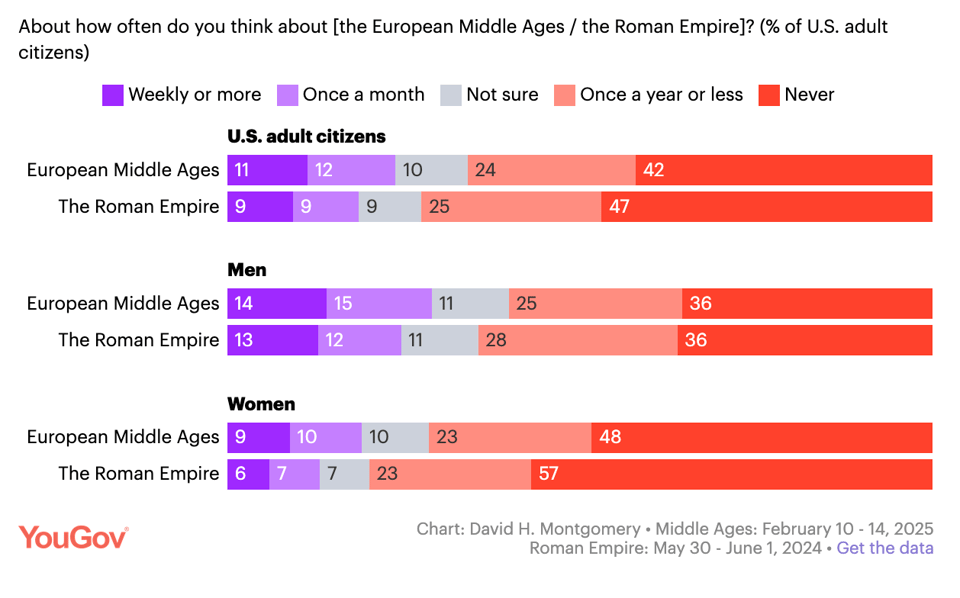
Granted, it’s not a huge difference in those who think about the periods frequently (23% for the Middle Ages, compared to 18% for Rome) but the more interesting, even if not terribly surprising, thing is the gender breakdown. Men think about both more of course, but women are more likely to be interested in the medieval world than Rome. Maybe it has something to do with the castlecore trend that we’ve talked about?
Also interesting is HOW people know things about the Middle Ages. Survey says:
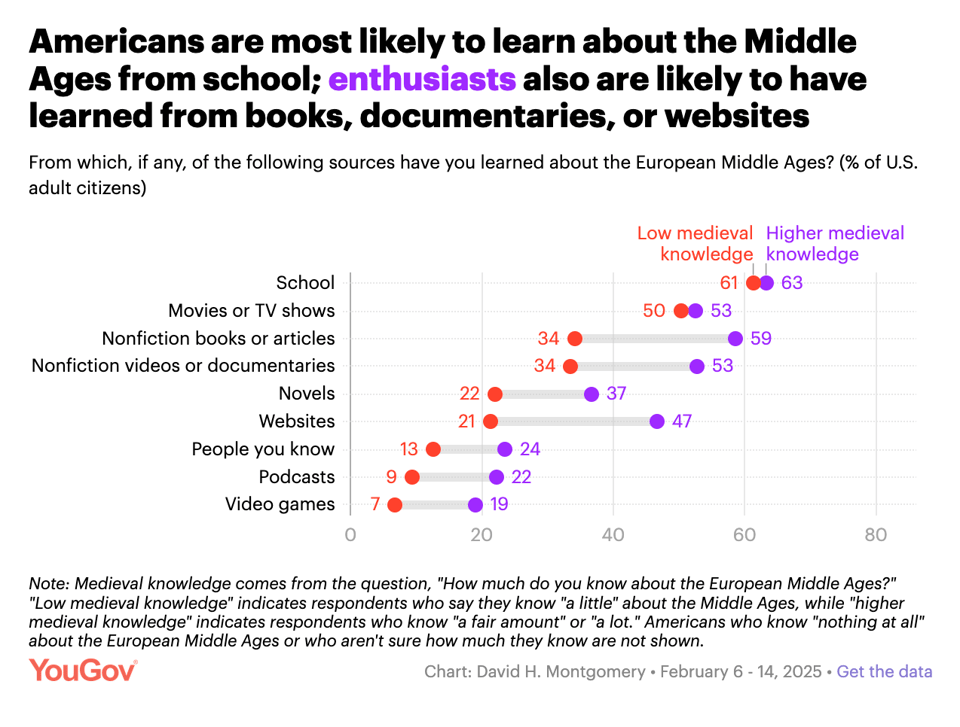
School is highest on the list, which is good. Keep taking our classes. Take more of them! Nonfiction books - hopefully, maybe, we dunno, like The Bright Ages and Oathbreakers - being high on the list are also a good sign.
But let us note a few other things. Video games being low on the list is heartening, a sign that people can - really - understand the difference between fiction and nonfiction. Podcasts is kind of surprising. Would’ve thought it’d be higher. But look at TV/movies. That’s a big one. And it matches a similar survey done by the American Historical Association back in 2019.
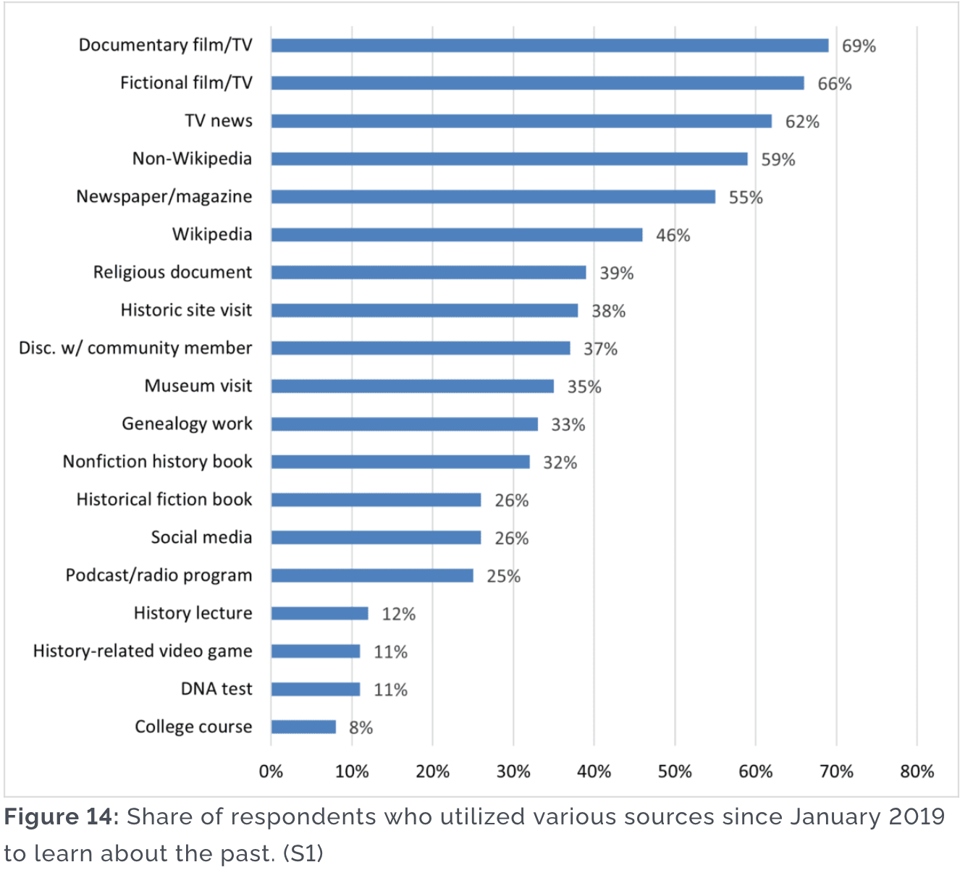
Look at those TV numbers! Historians need to be on screens more, talking about our work.
But we’re burying the lede. Perhaps the biggest (even if not at all surprising) result is this: Americans still think of the European Middle Ages as the dark ages.
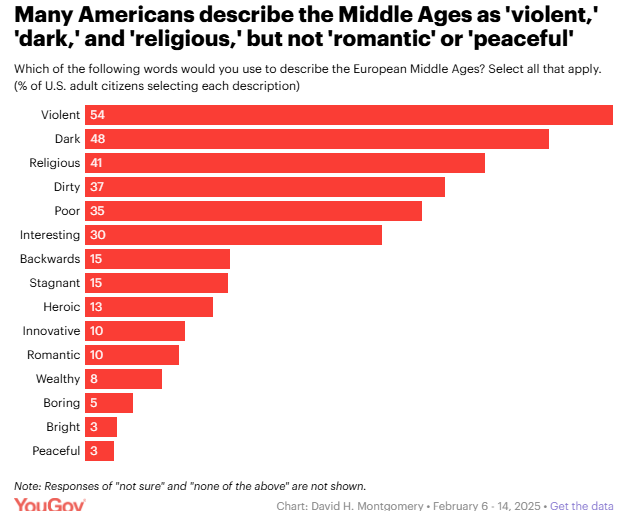
Now, a caveat. The way this works is that the respondents select from terms that have been made available to them. But note the terms that come up the most - the only ones noted by more than 1/3 of respondents:
Violent
Dark
Religious
Dirty
Poor
These words are, of course, all applicable to the period. The Middle Ages was a time of horrendous violence, of poverty, and of religion. That’s also true of every other period in history, including this one. (Although we guess electric lights help with that darkness one.)
But what interests us in particular today is how the name for the period itself - “Dark Ages” still sticks.1 And this conclusion is supported by another question in the poll.
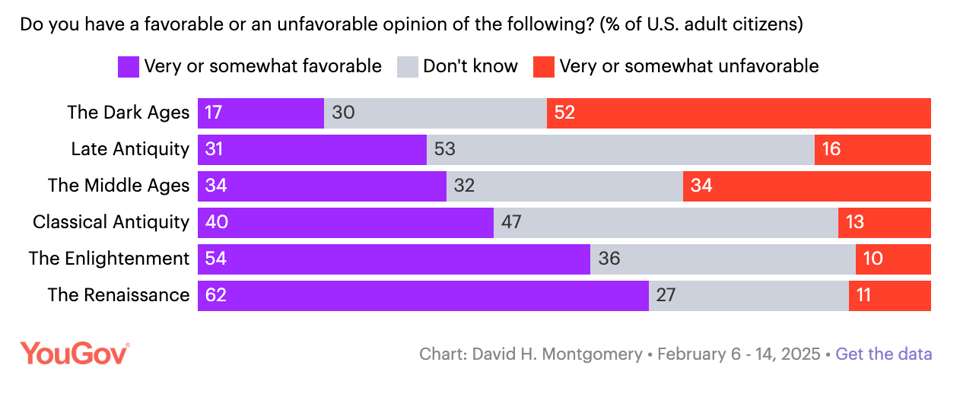
“The Renaissance” has the highest, and likely most undeserved, favorability. But “The Dark Ages” and “The Middle Ages” are the only periods - THE ONLY ONES - with significant unfavorable numbers.
In no way would we, or any other right-thinking medievalist, argue that the medieval world was some golden age, some period to be emulated. But it’s a period worth studying, worth thinking about. It’s not good or bad in and of itself, but rather a time filled with horrors and wonders, just like any other period. We want, in other words, to reach the people who answered “interesting” on the adjectives describing the period. We don’t want people to romanticize the European Middle Ages, to nostalgically pine for a period that was indeed shaped by violence and oppression. But we think that those horrors and wonders should be understood.
That’s why we (and many other medievalists) do the work we do, not just in our teaching but in also trying to reach wider publics, trying to find ways to communicate the complexity and messiness of the European medieval past with more people in more contexts. It’s why we do this newsletter (subscribe if you haven’t!).
The classroom is vital, but one of the reason we wrote The Bright Ages as a readable book, one you could pick up at a train station or airport. The people who self-select to take a medieval studies class are already most of the way there. Although many people now use The Bright Ages in class (please assign it! Let us know! We’ll zoom in any time!), we were hoping to reach outside the walls of our institutions. We wanted it to be short. We wanted it be be unputdownable. And we wanted it be affordable.
In that YouGov poll, there was another question asked:
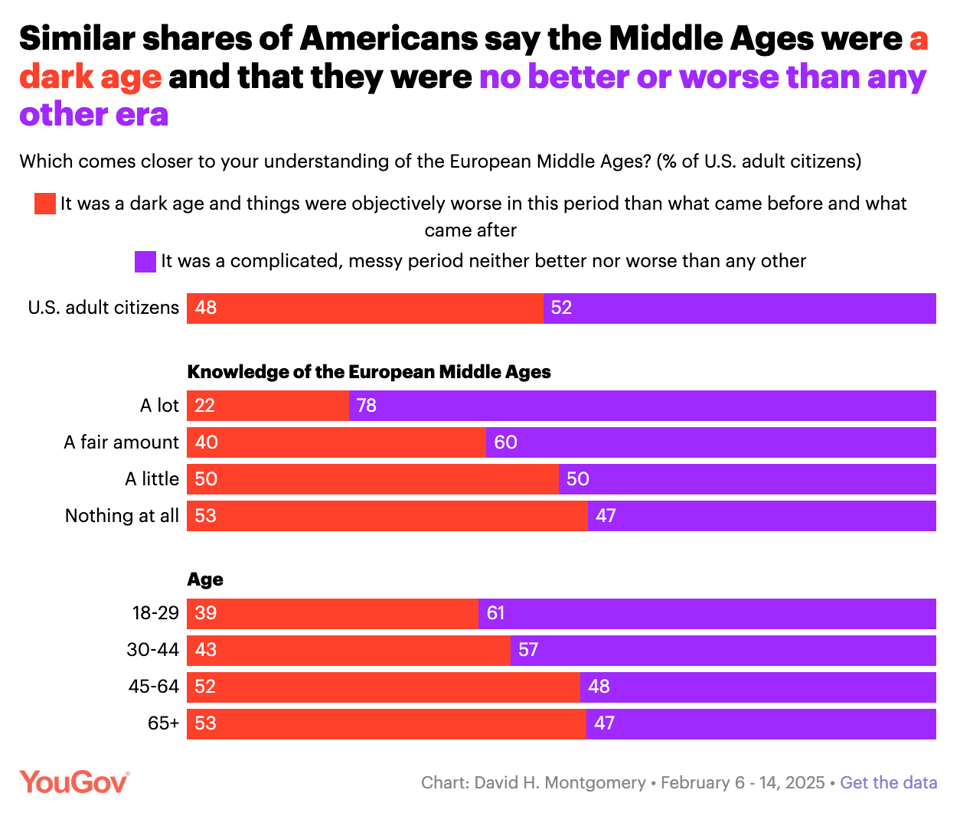
Yes, 48% of Americans think of the medieval world as a “dark age” but a majority, 52%, think of the period as “complicated, messy” and “neither better nor worse than any other.” Among people who said they knew a lot or a fair amount about the Middle Ages, the “complicated/messy” response was a strong majority.
Understanding more about the medieval world won’t save our own world. The medieval can and has and will be deployed for terrible ends, as a model to justify violence, as a nostalgic ideal to suppress knowledge, as a way to divide people and oppress those who are considered “different.”
But “complicated/ messy” matters because it shows us how things didn’t have to turn out how they did, our world doesn’t have foreclosed futures. The past, as we’ve said many times and will say many more, shows us possible worlds.
For every voice advocating violence, there was one (and more) arguing peace. For every politician trying to suppress what was taught at a university, there were students and faculty who protested and fought back and, in solidarity, went on strike. For every argument about oppression, there were people who found community in diversity.
Yes, even in the Middle Ages. And if in the Middle Ages, why not in our own modern world?
We should be clear here that “Dark Ages” means different things in the US than in the UK. In the UK, it’s still a relatively common term for the early Middle Ages, after the Roman legions left the island. In the US, it’s a term that stands for the whole period. ↩
-
One could make an argument that the middle ages were a golden age…if we're talking about the Islamic world. After all, that's where we get hospitals, and advances in mathematics such as algebra and concepts such as Zero (among many other advances in science). But when I think of the middle ages, I think of the Crusades and the anti-Semitism it brought, and that doesn't sit well with me as a Jew. I realize the European middle ages were more complicated than that, but it's just those that sit with me.
Add a comment: